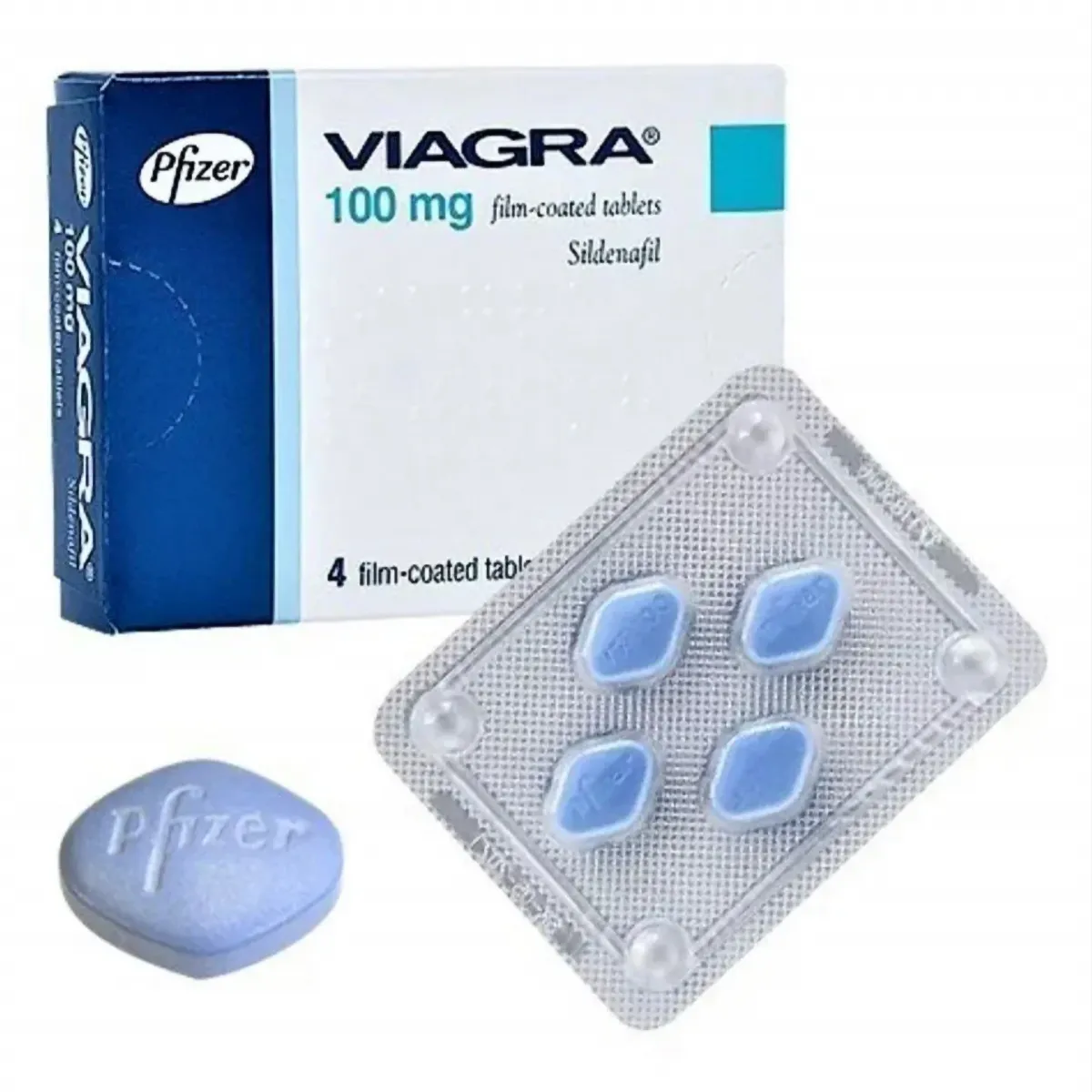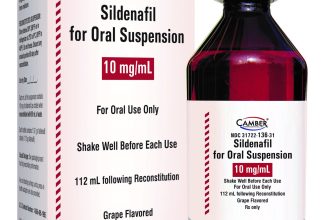Viagra 100mg contains 100 milligrams of sildenafil citrate, a potent phosphodiesterase-5 (PDE5) inhibitor. This high dosage ensures a significant increase in blood flow to the penis, facilitating erections.
The strength, however, is relative. Individual responses vary considerably based on factors like age, overall health, and the presence of other medical conditions. While 100mg often provides excellent results, it might be too strong for some, leading to side effects. Conversely, others may require a higher dose for optimal results. Always consult a physician to determine the appropriate dosage.
Potential side effects at this dosage include headaches, facial flushing, nasal congestion, and indigestion. Rarely, more serious side effects can occur. Proper medical guidance helps mitigate risks and ensures safe usage. Remember, self-treating can be dangerous. A doctor can assess your individual needs and prescribe the safest and most effective dose.
Consider alternatives. If 100mg proves too strong or ineffective, your doctor may suggest lower dosages of Viagra or explore alternative treatments like Cialis or Levitra. These medications also treat erectile dysfunction but vary in their duration of action and potential side effects. The best choice depends entirely on your unique circumstances.
- How Strong is Viagra 100mg? A Detailed Look
- Understanding Sildenafil’s Action
- Factors Affecting Viagra’s Strength
- Dosage Considerations
- Potential Side Effects
- Seeking Professional Guidance
- Alternative Treatments
- Viagra 100mg: The Dose and its Effects
- Understanding Sildenafil Citrate: The Active Ingredient
- Factors Influencing Viagra’s Effectiveness
- Dietary and Lifestyle Factors
- Specific Medications to Consider
- Comparing Viagra 100mg to Other Dosages
- Factors Influencing Dosage
- Understanding Dosage Differences
- Potential Side Effects of Viagra 100mg
- Viagra 100mg and Pre-existing Health Conditions
- Interactions with Other Medications and Substances
- When to Consult a Doctor about Viagra 100mg
How Strong is Viagra 100mg? A Detailed Look
Viagra 100mg contains 100 milligrams of sildenafil citrate, the active ingredient. This is the highest standard dosage available without a prescription increase.
Understanding Sildenafil’s Action
Sildenafil works by increasing blood flow to the penis, aiding in achieving and maintaining an erection. The 100mg dose provides a higher concentration of sildenafil, potentially leading to a stronger effect compared to lower doses. However, individual responses vary greatly.
Factors Affecting Viagra’s Strength
- Individual Metabolism: How your body processes medication impacts its strength.
- Underlying Health Conditions: Certain conditions like heart disease or liver problems can alter Viagra’s efficacy.
- Concurrent Medications: Interactions with other drugs can influence results. Always inform your doctor about all medications you’re taking.
- Diet and Alcohol: Heavy meals or alcohol consumption can reduce Viagra’s effectiveness.
Dosage Considerations
A doctor will determine the appropriate dosage based on individual needs and health history. Starting with a lower dose (like 50mg) is often recommended, then adjusting as needed. Never exceed the prescribed dosage.
Potential Side Effects
- Headache
- Facial flushing
- Nasal congestion
- Indigestion
- Muscle aches
Serious side effects are rare but require immediate medical attention. These include chest pain, prolonged erection (priapism), and vision changes.
Seeking Professional Guidance
Before using Viagra 100mg or any other medication, consult a healthcare professional. They can assess your health, evaluate potential risks, and determine the safest and most effective treatment plan.
Alternative Treatments
Other treatments for erectile dysfunction exist, including oral medications, injections, and vacuum devices. Your doctor can discuss suitable options based on your individual circumstances.
Viagra 100mg: The Dose and its Effects
Viagra 100mg is a common starting dose for erectile dysfunction (ED). It’s important to understand that its effects vary based on individual factors.
Expect improved erectile function, allowing for firmer and easier-to-achieve erections. The duration of effectiveness is typically four to five hours. However, this can be influenced by factors like age, overall health, and diet.
- Onset of effects: You might notice effects within 30 minutes to an hour after taking it. Timing can shift depending on individual metabolism and whether you’ve eaten a fatty meal recently.
- Side effects: Common side effects include headache, flushing, nasal congestion, and visual disturbances. These are generally mild and temporary. Severe side effects are rare but include prolonged erection (priapism) and sudden vision or hearing loss. Consult a doctor immediately if you experience these.
- Dosage adjustments: Your doctor may adjust your dosage based on your response and tolerance. The dose may be lowered to 25mg or increased to a maximum of 100mg. Never exceed the prescribed dose without medical advice.
Taking Viagra 100mg with nitrates or certain heart medications can be dangerous. Always inform your doctor about all medications you’re taking.
- Alcohol interaction: Excessive alcohol consumption can reduce the effectiveness of Viagra and increase the risk of side effects.
- Food interaction: Fatty foods can delay absorption, affecting the onset of action.
- Underlying health: Pre-existing heart conditions, high blood pressure, or liver/kidney problems require careful medical assessment before Viagra use.
Remember: Viagra is a prescription medication. It’s crucial to discuss its use with your healthcare provider to ensure its safety and efficacy for you. They can assess your health, discuss potential risks, and help determine the appropriate dosage.
Understanding Sildenafil Citrate: The Active Ingredient
Sildenafil citrate is the active component in Viagra. It belongs to a class of drugs called phosphodiesterase-5 (PDE5) inhibitors.
This medication works by increasing blood flow to the penis, facilitating an erection. Specifically, sildenafil inhibits PDE5, an enzyme that breaks down cyclic GMP, a substance crucial for achieving and maintaining an erection.
The 100mg dosage is a common strength, but the appropriate dose varies depending on individual factors and medical advice. Always consult your doctor to determine the correct dosage for your needs.
Remember, sildenafil interacts with certain medications. Disclosing all your current medications to your physician is crucial before starting treatment.
Potential side effects can include headache, flushing, nasal congestion, and upset stomach. Rare but serious side effects are possible; immediate medical attention is necessary if you experience them. Your doctor can provide a detailed list of potential side effects.
Sildenafil is not a solution for every case of erectile dysfunction. Underlying medical conditions might require additional treatment or a different approach altogether. Your doctor can assess your situation and recommend the best course of action.
Factors Influencing Viagra’s Effectiveness
Viagra’s potency depends heavily on several key aspects. Your age plays a significant role: older men might need a higher dose or experience a less pronounced effect. Similarly, your overall health significantly impacts how well it works. Conditions like heart disease, high blood pressure, or diabetes can interfere with blood flow, reducing Viagra’s efficacy. Certain medications can also interact negatively, diminishing or enhancing its effects. Always inform your doctor about all prescription and over-the-counter drugs you’re taking. This includes medications for chest pain, high blood pressure, or even some antibiotics.
Dietary and Lifestyle Factors
Diet and lifestyle choices also affect Viagra’s performance. A diet high in saturated fats can negatively influence blood circulation, potentially hindering the drug’s impact. Similarly, excessive alcohol consumption or smoking can also impair blood vessel function and reduce its effectiveness. Regular exercise and maintaining a healthy weight are crucial for optimal blood flow, potentially improving results. Finally, the psychological aspect should not be underestimated; stress, anxiety, and relationship problems can all contribute to erectile dysfunction, regardless of medication.
Specific Medications to Consider
Nitrates, commonly prescribed for chest pain, pose a serious risk when combined with Viagra, causing a dangerous drop in blood pressure. Alpha-blockers, often used to treat high blood pressure and enlarged prostate, can also interact negatively, resulting in significantly lowered blood pressure. Some antifungal medications may interfere with Viagra’s metabolism, impacting its efficacy. Consult your physician for a complete list of potential interactions before starting Viagra or any similar medication.
Comparing Viagra 100mg to Other Dosages
Viagra comes in 25mg, 50mg, and 100mg tablets. The best dosage depends entirely on individual needs and response. A doctor determines the appropriate starting dose, often 50mg. If that’s ineffective, they might increase it to 100mg. Conversely, if side effects are too strong, they might decrease it to 25mg.
Factors Influencing Dosage
Your age, overall health, and other medications you take influence dosage selection. Pre-existing conditions like heart disease require careful consideration and potentially lower starting doses. Liver and kidney function also play a role, as these organs process the medication. Always consult your doctor before adjusting your dosage.
Understanding Dosage Differences
A higher dosage, like 100mg, doesn’t automatically mean better results. It simply means more of the active ingredient is present. The increased potency might lead to stronger effects but also a higher risk of side effects. Conversely, a lower dosage might be sufficient for some individuals, minimizing potential side effects while achieving desired results. Regular monitoring is key to finding the optimal dose for you.
Potential Side Effects of Viagra 100mg
Viagra 100mg, while effective for many, can cause side effects. Common ones include headache, flushing, nasal congestion, and indigestion. These usually are mild and temporary.
More serious, though less frequent, side effects include vision changes (blurred vision, blue tint to vision), prolonged erection (priapism), and hearing loss. Seek immediate medical attention if you experience a prolonged erection lasting more than four hours or sudden hearing loss.
Low blood pressure is another potential concern, especially if you also take nitrates or certain other medications. Always inform your doctor about all your current medications and health conditions before starting Viagra.
Muscle aches, dizziness, and back pain have also been reported. If you experience any concerning side effects, contact your doctor or pharmacist for advice. They can help you manage these effects or suggest alternative treatments.
Remember, this information is not exhaustive. Consult your doctor for personalized advice regarding potential risks and benefits.
Viagra 100mg and Pre-existing Health Conditions
Always consult your doctor before using Viagra 100mg, especially if you have pre-existing health issues. This is paramount for your safety.
Heart conditions require careful consideration. Viagra can lower blood pressure, potentially causing problems for individuals with angina, heart failure, or recently experienced a heart attack or stroke. Your doctor will assess your suitability.
High blood pressure, if poorly controlled, can interact negatively with Viagra. Your doctor will need to evaluate your blood pressure management before prescribing.
Liver or kidney disease can affect how your body processes Viagra. Dosage adjustments or alternative treatments might be necessary. Open communication with your physician is key.
Retinitis pigmentosa, a rare eye disease, carries a heightened risk of visual side effects with Viagra use. Discuss this with your ophthalmologist and your doctor.
Blood disorders, such as sickle cell anemia, multiple myeloma, or leukemia, can increase the risk of adverse events. Your hematologist’s input is vital.
Peptic ulcers or stomach problems may be exacerbated by Viagra. Your doctor can advise on medication interactions and potential alternatives.
Remember: This information is not a substitute for professional medical advice. A thorough medical history is crucial before starting Viagra 100mg. Your doctor can help determine if Viagra is safe and appropriate for you given your individual health profile.
Interactions with Other Medications and Substances
Always inform your doctor about all medications you’re taking, including over-the-counter drugs, herbal remedies, and supplements, before starting Viagra. This includes nitrates, commonly used to treat chest pain. Combining Viagra with nitrates can cause a dangerous drop in blood pressure.
Alpha-blockers, frequently prescribed for high blood pressure or prostate problems, can also interact with Viagra, potentially leading to dizziness or fainting. Your doctor might adjust your dosage or recommend alternatives.
Certain antifungal medications, like ketoconazole and itraconazole, can increase Viagra’s concentration in your blood, potentially intensifying its effects and side effects. Similarly, protease inhibitors used to treat HIV can have a similar impact.
Grapefruit juice can also affect how your body processes Viagra. Avoid grapefruit juice while taking Viagra to prevent unexpected side effects or increased intensity.
Alcohol consumption can worsen Viagra’s side effects, such as headaches and dizziness. Limit alcohol intake while using Viagra.
This information is not exhaustive. Discuss all your medications and health conditions with your doctor to ensure Viagra is safe for you and to minimize potential interactions.
When to Consult a Doctor about Viagra 100mg
Always consult your doctor before starting Viagra 100mg, especially if you have underlying health conditions.
Schedule a doctor’s appointment if you experience any of the following:
| Symptom | Action |
|---|---|
| Chest pain, irregular heartbeat, or dizziness | Stop taking Viagra and seek immediate medical attention. These could indicate a serious heart problem. |
| Sudden vision loss or hearing loss | Discontinue Viagra use and contact your doctor or ophthalmologist immediately. These are rare but serious side effects. |
| Prolonged erection (priapism) lasting more than four hours | Seek immediate medical help. This is a medical emergency. |
| Severe headache, nausea, or flushing | Inform your doctor about these side effects. They might suggest an alternative dosage or medication. |
| Allergic reactions (rash, itching, swelling) | Stop taking Viagra and contact your doctor or allergist immediately. |
| Persistent back pain or muscle aches | Discuss these side effects with your doctor. They can help manage these symptoms. |
Regular check-ups with your doctor are recommended while taking Viagra, particularly if you have pre-existing conditions like heart disease, high blood pressure, or diabetes. Your doctor will monitor your progress and adjust your treatment plan as needed.
Do not take Viagra with nitrates or other medications that interact negatively with it. Always provide your doctor with a complete list of your medications before starting any new treatment.





